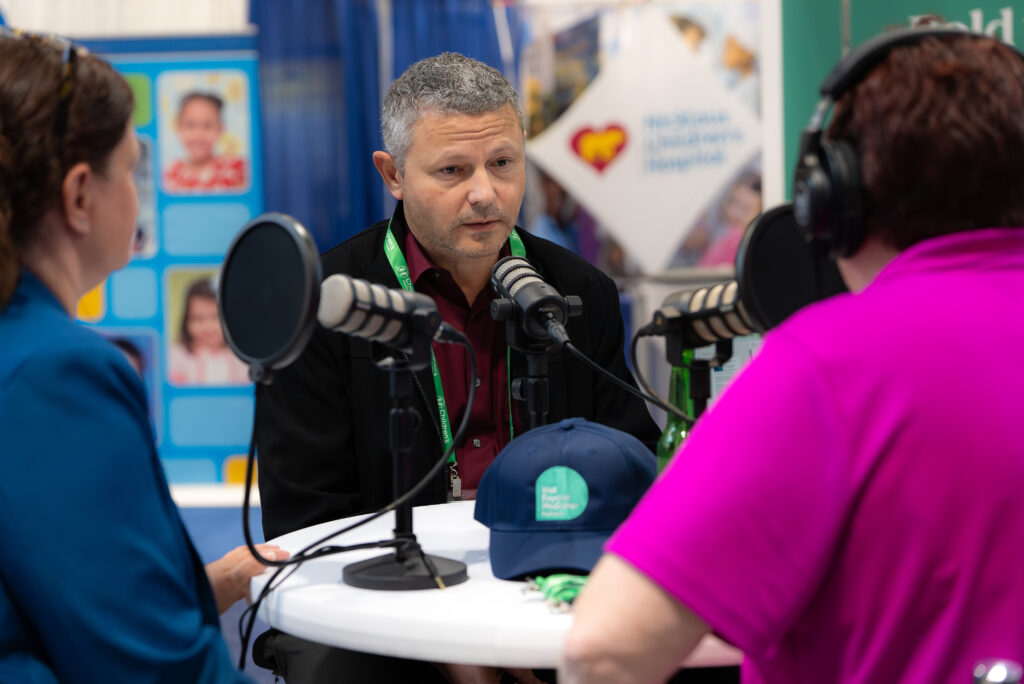In this mini-episode, we catch up with Dr. Tamarah Westmoreland, associate professor of surgery, and research scientist Dr. Joseph Mazar, both from Nemours Children’s Hospital, Florida. Previously featured on
episode 49, Drs. Westmoreland and Mazar discussed their groundbreaking paper published in Cancer Research Communications by the American Association for Cancer Research, exploring the
use of the Zika virus to combat cancer.
On today’s mini-episode, they provide an exciting update on their ongoing research.
EXCITING UPDATE – AUG. 20, 2024: Nemours Children’s received its largest donation to a single research project thanks to the
Pass It On to Kids Foundation. Its $7 million donation will advance the groundbreaking research harnessing the Zika virus to target and eradicate neuroblastoma and ovarian cancers.
Guests:
Tamarah J. Westmoreland, MD, PhD, Associate Professor of Surgery, Nemours Children’s Hospital, Florida
Joseph Mazar, PhD, Research Scientist, Nemours Children’s Hospital, Florida
Host/Producer: Carol Vassar
EPISODE 78 TRANSCRIPT
Carol Vassar, podcast host/producer:
Welcome to Well Beyond Medicine, the Nemours Children’s Health Podcast.
Each week we’ll explore anything and everything related to the 80% of child health impacts that occur outside the doctor’s office. I’m your host, Carol Vassar. And now that you are here, let’s go.
Music:
Well Beyond Medicine!
Carol Vassar, podcast host/producer:
It’s a mini episode research update podcast recorded during our recent trip to the Pediatric Academic Societies Meeting in Toronto. That’s where Dr. Tamarah Westmoreland, Associate Professor of Surgery with Nemours Children’s Health, and research scientist Dr. Joseph Mazar, also with Nemours Children’s Health, joined us. They were on the podcast back in January, talking about the paper they authored and published in the peer-reviewed journal Cancer Research Communications from the American Association for Cancer Research on using the Zika virus to fight cancer. Dr. Westmoreland tells us more, and together, they fill us in on what’s been happening in their research world since January.
Dr. Tamarah Westmoreland, Nemours Children’s Health:
The publication focuses around high-risk neuroblastoma, and neuroblastoma is a tumor that occurs in childhood, and it can go from being benign to widely metastatic and deadly. The high-risk neuroblastoma group are about 50% of the patients, and their overall survival at five years is only 40 to 50% with intensive therapy. So our lab focuses on high-risk, neuroblastoma novel therapies, and what this paper really illustrated is the in vivo or mouse modeling of the novel use of Zika virus to directly treat neuroblastoma. And I want to bring in Dr. Mazar to talk about some of the new things that we’ve been doing in addition to this paper.
Carol Vassar, podcast host/producer:
And this is new since January, so…
Dr. Tamarah Westmoreland, Nemours Children’s Health:
Yes.
Dr. Joseph Mazar, Nemours Children’s Health:
Oh yes. So, the irony is that the work that we published in January is actually about a year old. And so we’ve have about a year and a half of work that we’ve accumulated since then further pursuing this project. So, the work that was published was to try to show the efficacy, the robustness of how effective this approach is, because it’s not simply that Zika can selectively target the tumor and eliminate it. It’s the fact that the hosts are completely asymptomatic.
So, one of the concerns we’ve had when we started a number of years ago looking into therapies for pediatrics is the severe late effects that chemotherapy induces in children. And these can be wide-ranging and lifelong. And so from the very beginning, we looked at this not simply as a potential therapy for a lethal pediatric cancer, but a therapy that also doesn’t incur those same kinds of effects. So what we want here is to put as little footprint as possible on the life of the patient while simultaneously offering as viable, if not more so, an alternative therapy to the current mechanisms.
Carol Vassar, podcast host/producer:
So, how does this go about doing that? Talk about the mechanisms.
Dr. Joseph Mazar, Nemours Children’s Health:
Sure. So, what we found is that this was actually the basis for our idea. Back in 2016 following the epidemic in South America, there was a group that was trying to determine why it was that the adults and even children were effectively asymptomatic to this disease. Everyone had them but…
Carol Vassar, podcast host/producer:
To Zika virus.
Dr. Joseph Mazar, Nemours Children’s Health:
To Zika virus, and yet nobody had any side effects. They virtually were unaware of the fact that they were even infected at all. So, the effect was entirely fetal. And so what these researchers determined was that cells that were in a developing state were hypersensitive to the virus, but the same cells, when they were mature, were virtually completely resistant. And so we asked the question, “All right, if these cells, these developing neurons are called neuroblasts, if they’re hypersensitive, would a cancer that developed from these immature neurons would it remain sensitive?” And that’s what neuroblastoma is. And what we found out was absolutely, they’re incredibly sensitive, but the surrounding cells, normal cells, are completely resistant.
Dr. Tamarah Westmoreland, Nemours Children’s Health:
And I want to just step in, one thing, and it’s not just a certain type of neuroblastoma, it was any of the neuroblastomas. So an early stage or low-risk neuroblastoma, intermediate risk, the high risk, the recurrent neuroblastoma that’s resistant to chemotherapy. So through the paper that began all of this in 2018 and PLOS up to the paper that we had in January, really we have tested every type of neuroblastoma in mice to show that direct treatment with Zika virus is oncolytic, it directly kills the tumor.
Dr. Joseph Mazar, Nemours Children’s Health:
Right. So, with as little as a single dose, we’re eliminating the tumors. And so one of the concerns with a lot of chemotherapies is that they’re what’s called tumor growth suppressors. So, they are slowing the tide. They’re not actually killing the tumor. So maybe it gives you more time, but ultimately the result very often is the same. That is not what’s happening here. Zika is killing the tumor. And so we see incredibly low incidence of recurrence. So when we use Zika, it’s not just eliminating it. It’s doing it permanently.
Dr. Tamarah Westmoreland, Nemours Children’s Health:
And we showed this looking at histology to show what was left in the mouse was really just scar. And then we took it a step further because it’s not enough to show that your novel drug or virus can kill a tumor. You need to show that the mouse has a survival advantage with the treatment. And we clearly show this, and that’s illustrated in our latest paper.
Carol Vassar, podcast host/producer:
Now, you talked about not putting a strong footprint within a child with neuroblastoma. That’s one of the disadvantages of chemotherapy is it not only works on the neuroblastoma itself, but it also kills other cells within the body. What effect does Zika have on other cells in the body?
Dr. Joseph Mazar, Nemours Children’s Health:
So, actually, the irony is that Zika is a disease we’ve known about for more than 70 years. Globally, somewhere between a hundred and 200,000 people are infected with Zika. And ultimately the vast, vast majority are asymptomatic, which means that they have absolutely no side effects at all, and most don’t even know they even have it. And so what we saw with the mice is exactly that. Every one of the mice was asymptomatic. We didn’t even have morbidity. In other words, they weren’t even sick. They literally had no symptoms at all.
And by now, we’ve done more than 30 of these experiments. So what we see is that the mice that are treated with Zika, the tumors are eliminated rapidly with a very low incidence of recurrence, and yet they’re in perfect health.
Dr. Tamarah Westmoreland, Nemours Children’s Health:
Right. The experiment with the survival study that I mentioned, those treated mice didn’t die because of any issue from the tumor, from the treatment. We just needed to end the study because they were living and growing with no problems.
Carol Vassar, podcast host/producer:
So where do you go next?
Dr. Joseph Mazar, Nemours Children’s Health:
Right. So, we’ve done any number of different elements associated with neuroblastoma. In other words, early, late, chemotherapy resistant. One of the concerns is what is the immune cell response in the host? And we’ve actually shown that in completely immune-competent mice. So, these are mice who have a perfectly normal immune system. Absolutely nothing happens to the mice. They’re in perfect health. But we’ve even also shown that mice that are severely immunocompromised are also not affected by the virus at all. So that’s a concern because many children may have some level of immune compromising when they go into treatment. And what we see is that that has no effect at all on the virus.
Carol Vassar, podcast host/producer:
This is amazing stuff. When are we going to see this in humans?
Dr. Tamarah Westmoreland, Nemours Children’s Health:
Yeah. I think that’s the question we all think about. And whenever you’re working with a virus, we need to basically repeat the studies multiple times. And I think, like Dr. Mazar mentioned, looking at the immune system. And one other step that we would like to study and actually already have it in the process is metastatic disease. So when the tumor is at multiple sites, and we are in the process of doing that study right now and are already talking with our clinical partners in the pre-design of a clinical trial. And what’s nice at Nemours is that we have many clinical researchers. We have cog researchers or children’s oncology group researchers, right within Nemours. So we can start these conversations and planning.
Carol Vassar, podcast host/producer:
More to come.
Dr. Tamarah Westmoreland, Nemours Children’s Health:
Yes.
Dr. Joseph Mazar, Nemours Children’s Health:
Absolutely.
Carol Vassar, podcast host/producer:
Nemours researchers, Dr. Tamara Westmoreland and Dr. Joseph Mazar with an exciting update on the potential for using Zika virus to someday fight cancer.
Are you interested in learning more about this groundbreaking research? Check out Episode 49 of the Well Beyond Medicine Podcast, where you’ll hear doctors Westmoreland and Mazar go in-depth on the topic. In fact, we’ll make it easy and put a link to that episode in the show notes for this one.
Thanks to both Dr. Westmoreland and Dr. Mazar for checking in with us at PAS, and thanks to the team who produced this episode, including Che Parker, Cheryl Munn, Joe Gillespie, Susan Masucci, and Lauren Teta. And, of course, thanks to you for listening.
Next time, we’ll share our conversation with Vanderbilt University Medical Center’s Michael DeBahn, who is currently serving as president of the American Pediatric Society. He’s using his time in this position to raise awareness about the health of children and adolescents in our nation’s jails and prisons. And we’ll talk about just that topic. I’m Carol Vassar, and until next time, remember, we can change children’s health for good – well beyond medicine.
Music:
Well Beyond Medicine










